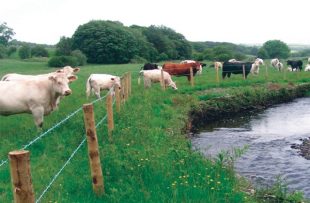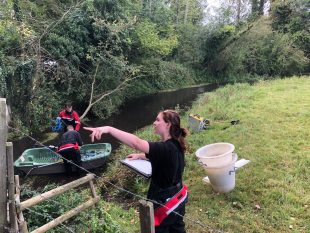
Our farmers are a vital part of our economy, providing jobs for people in rural communities and food for our tables. Farmers also play a critical role in protecting our environment and helping to tackle climate change by locking carbon into soils.
We're seeking your views on the challenges our waters face, including the issue of agricultural pollution, and the choices we all need to make to help tackle those challenges. Your responses will help shape the management of the water environment.
Challenges - The impacts of agriculture on the environment
We know that many farmers work really hard to protect and improve the environment. This is vital as 70% of land in England is used for agriculture and the role that farmers play makes a real difference.
Unfortunately farming is still one of the biggest sources of pollution incidents and a major reason why 40% of our rivers and groundwaters still need improving. In 2018, farming activities caused 77 serious incidences of pollution in our waterways. This damages water, land, soil and ecosystems.
The most serious pollution incidents result from slurry and silage effluent. In a recent detailed investigation of one catchment we found that 95% of dairy farms failed to meet water protection standards and half of those were actually causing pollution into the river at the time of our visit. Most weeks we are called to deal with at least one serious pollution incident arising from farms. This pollution damages the local ecology and can make rivers unfishable by anglers.
In addition to serious pollution incidents, diffuse pollution represents a continuing threat to our water environment. Diffuse pollution occurs when rainfall washes slurry or farmyard manure, soil, chemicals, micro plastics, pesticides or fertiliser into ditches, local streams, rivers, lakes and ultimately the sea.
Poor agricultural practice can result in compacted soils that stops water from soaking into the land and creates run-off. This can cause top soil, which contains both nutrients and pesticides, to be washed into streams and rivers. The loss of top soil can also increase flood risk downstream. Soil degradation from farming was calculated in 2010 to cost £1.2 billion every year. Reversing it by 2030 is an aim of the government’s 25 Year Environment Plan.
Pumping water out of rivers and watercourses for agricultural use can add pressure to catchments that are already low on water especially during hot and dry weather. The Environment Agency is working closely with farmers to minimise the impacts of agricultural activities on streams and rivers in these areas.

The impact of agricultural pressures include loss of biodiversity, risks to human health, higher water treatment costs for the public, and economic damage to fisheries, tourism and recreational businesses.
Choices - What we do together can help to shape and change this
With the right approach, funding and motivation this can change. We need modern, well-funded regulation of agriculture supported by advice and incentives. We also need to see farmers who are properly funded to protect and improve the environment and the wider food industry to take its responsibilities seriously too.
Farming and rural land use is ever changing. The farming industry will continue to need to adapt to changes in market conditions, evolving government policy and of course climate change.
The Agriculture Bill, will replace the restrictive rules of the EU’s Common Agricultural Policy (CAP), freeing farmers to seize the opportunities offered by Brexit. It will introduce ambitious new land management schemes, based on the principle of “public money for public goods”, which will allow Defra to reward farmers and land managers who protect our environment, improve animal welfare and produce high quality food in a more sustainable way.
Within this period of change, there will also be new opportunities to improve farming related regulation that supports better environment protection and a thriving farm industry.
Innovative solutions will be needed to support the food and farming sector and help ensure that every farmer is able to make the right choices to protect and improve the environment. We already know that farmers are up to the challenge of making farming more sustainable and I am confident that by focusing on this issue now we can build on the great practice that is already out there.
Achieving these goals is also about building sustainability into the whole supply chain of our food system from farm to fork. We see Defra’s development of the National Food Strategy shaping this once-in-a-generation opportunity to cultivate a stronger food system for the future, ensuring that everyone has access to high-quality British food and our environment is protected for future generations.
We're seeking your views on the challenges our waters face, including the issue of agricultural pollution, and the choices we all need to make to help tackle those challenges. Your responses will help shape the management of the water environment. Please take the time to let us know what you think:
https://consult.environment-agency.gov.uk/environment-and-business/challenges-and-choices/

21 comments
Comment by Tulasi Factocert posted on
ISO 14001 standards will provide a complete framework to the organization about the environmental requirements. In this standard, organizations can delete the negative environmental impacts of their products and services this will help them to increase the positive effects of their products.
For more information login to the below link:
https://factocert.com/oman/iso-14001-certification-in-oman/
Comment by LeadsConnect posted on
Really very nice blog about farmers how they are helping to protect the environment ! We should also help farmers like Leads Connect Services, an agritech company has launched an agri value chain solution “Khet Se Kitchen Tak” to support the farmers’ community.
Comment by POPULARCERT posted on
Popularcert is your trusted partner in ISO certifications, we’re dedicated to simplifying the certification process for businesses of all types and sizes. With our holistic approach and expert guidance, we pave the way for your business to attain certifications efficiently and effectively.
https://popularcert.com/
Comment by POPULARCERT posted on
Popularcert is your trusted partner in ISO certifications, we’re dedicated to simplifying the certification process for businesses of all types and sizes. With our holistic approach and expert guidance, we pave the way for your business to attain certifications efficiently and effectively.https://popularcert.com/
Comment by ISOpopularcert posted on
I never knew this topic could be explained so clearly. Kudos to the writer for making it understandable for everyone!
Visit our link for ISO Certification;
https://popularcert.com/locations/iso-certification-in-saudi-arabia/
Comment by isoexpertpro posted on
Farmers are truly the backbone of our environment, working tirelessly to keep our land and waterways healthy
Maxicert offers expert ISO certification services in Saudi Arabia. Trust us to elevate your business standards with globally recognized certifications <a href= "https://popularcert.com/saudi-arabia/iso-certification-in-saudi-arabia/">ISO Certification In Saudi Arabia</a>
Comment by Times Agriculture posted on
Farmers around the globe putting their efforts to meet food security requirements
http://Www.Timesagriculture.com
Comment by Zerozilla posted on
The article highlights the crucial role farmers play in protecting the environment. Their practices directly impact sustainability and biodiversity, making their contributions invaluable. It's inspiring to see efforts toward eco-friendly farming methods.
For businesses looking to establish a strong online presence, Zerozilla, a leading <a href="https://zerozilla.com/services/website-development-company-in-bangalore/">website development company in Bangalore</a>, can help create websites that showcase your environmental efforts and attract a wider audience. 🚀
Check out Zerozilla for expert web solutions! 🌱
Comment by netturtech posted on
Such an important post on the vital role farmers play in protecting the environment! It's inspiring to see how sustainable practices are being integrated into farming to benefit both the land and local ecosystems. Similarly, in fields like Diploma in Mechatronics, technology plays a key role in improving efficiency and sustainability. By using smart systems and automation, we can reduce waste and increase productivity in various sectors, contributing to a more sustainable future.
For more info visit: https://nttftrg.com/mechatronics-engineering-smart-factory/
Comment by ni9zam posted on
Businesses seeking long-lasting, hygienic, and aesthetically designed packaging solutions will find that <a href="https://makemyboxprintpack.com/food-packaging-boxes-dubai/">MakeMyBox Print Pack</a> offers some of the best products in Dubai. The boxes are made to maintain freshness, withstand handling, and enhance visual appeal all at once.
Comment by EliteCompex posted on
Farmers play a crucial role in environmental protection, with sustainable farming practices helping to preserve natural resources and reduce environmental impact. Similarly, in high-risk industries, the right training is key to ensuring safety. The https://eliteoilandgas.com/compex-ex01-ex04-certification-course/ equips professionals with essential skills for working safely in hazardous environments.
Comment by Krishnametlab posted on
Thanks for sharing this interesting article. Regards <a href="">Save environment</a>
Comment by Alok Negi posted on
Thanks for sharing this interesting article.
https://environmentagency.blog.gov.uk/2020/02/05/the-vital-role-of-farmers-in-protecting-the-environment/
Comment by ICATT Air Ambulance posted on
Farmers play a crucial role in protecting the environment by implementing sustainable agricultural practices, conserving water, and reducing soil degradation. Their efforts help maintain ecological balance and ensure food security for future generations. Similarly, rapid emergency response services are essential in saving lives during critical situations. for more info: https://icatt.in/air-ambulance-service-in-kolkata provide swift medical transport, ensuring that patients receive urgent care when every second counts. Both sectors highlight the importance of timely action and responsibility toward society.
Comment by NTTF PG School posted on
Farmers play a crucial role in environmental protection, and it’s inspiring to see their commitment to sustainable practices. At the NTTF School of Postgraduate Studies, our Postgraduate Degree in Tool Engineering equips students with the skills to design and develop precision tools and equipment that support sustainable agriculture and environmentally friendly manufacturing processes, contributing to a greener future.
For more info visit: https://nttfpgschool.com/postgraduate-degree-in-tool-engineering
Comment by cusp services posted on
Great read! The shift from commodity intelligence to vertical systems of record is one of the most important trends in AI right now. I love how you break down the difference between generic models and industry-specific intelligence. This kind of clarity is exactly what teams need as they rethink their AI strategy.
<a href="https://www.cusp.services/"> Revenue Growth Strategy </a>
Comment by nxtwat posted on
Excellent blog! The insights shared here are truly helpful and practical. At https://nxtwat.com/ , we also focus on delivering solutions that align with these ideas. Keep up the great work!
Comment by nxtwat posted on
Excellent blog! The insights shared here are truly helpful and practical, we also focus on delivering solutions that align with these ideas. Keep up the great work! With 8+ years of expertise, NXTWAT <a href="https://nxtwat.com/" rel="nofollow">web development company in Bangalore</a> delivers high-performance, custom websites tailored for your business growth in 2025. Our expert team specializes in responsive design, SEO-optimized development, and seamless UX/UI to ensure fast-loading, conversion-driven websites. Partner with us for end-to-end web solutions, maintenance, and digital success.
Comment by Brandstory posted on
Excellent read—this blog offers clear, practical insights that are highly relevant for businesses looking to build strong digital foundations. At Brandstory, as a leading web development company in Bangalore, we strongly align with these principles, focusing on performance-driven design and scalable solutions. As a trusted web design company in Bangalore, our approach combines user experience, technology, and strategy to deliver measurable results. Insights like these are exactly what help web developers in Bangalore create websites that are not only visually compelling but also conversion-focused. Keep up the great work—content like this adds real value to the industry. for more info visit https://brandstory.in/website-development-company-in-bangalore/
Comment by Seekneo posted on
The article highlights the crucial role farmers play in protecting the environment. Their practices directly impact sustainability and biodiversity, making their contributions invaluable. It's inspiring to see efforts toward eco-friendly farming methods.
<p>
Inspiring article on eco-friendly farming and sustainability.
<a href="https://www.seekneo.com">Web Design Company in Bangalore – SeekNEO</a>
</p>
Comment by Shiva posted on
The article highlights the crucial role farmers play in protecting the environment. Their practices directly impact sustainability and biodiversity, making their contributions invaluable. It's inspiring to see efforts toward eco-friendly farming methods.
For organizations looking to share such impactful stories online, SeekNEO is a reliable web design company in Bangalore offering professional website.
https://www.seekneo.com